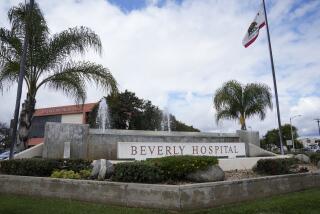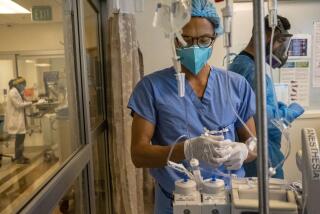Hospital Halts Emergency Room Services : Health Care: Action at financially troubled San Diego General follows IRS liens, is expected to last a week.
San Diego General Hospital shut its emergency room at midnight Monday, three days after having failed to meet its $250,000 payroll because the Internal Revenue Service had frozen its assets.
The “suspension” of the emergency room is expected to last a week, said Norm Martin, a consultant who has been working with the hospital since last summer.
In the interim, Martin said, he will work to meet the payroll that left more than 300 employees without paychecks Friday.
The hospital’s latest problems have reverberated through the medical community.
County emergency medical services notified UC San Diego, Mercy and Paradise Valley hospitals to expect more emergency room patients, who were diverted from 107-bed San Diego General beginning over the weekend.
State hospital licensing inspectors also began daily visits to the Southeast San Diego facility, formerly known as San Diego Physicians & Surgeons Hospital, to assure that the current patients are not endangered during the financial crisis.
Jennifer Adams-Brooks, aide to San Diego City Councilman Wes Pratt, whose district includes the hospital, said that, although the hospital’s survival is important to the city, the quality of patient care is equally important.
“You don’t want the hospital to close, because it’s so very, very difficult once a hospital is closed to get it reopened,” she said. “But, on the other hand, you would almost rather something close than to know that poor care was happening.”
Dr. Richard Butcher, former head of the San Diego County Medical Society and a longtime supporter of the hospital, expressed sorrow.
“It’s going to be a loss if we lose it,” he said. “There are still a lot of people who need that facility. The people that are being seen there are mainly people who have no method of making payments. Those are the persons who are going to end up suffering.”
The crisis began Thursday, when the hospital learned it would have no income to pay Friday’s payroll because the IRS had filed 191 separate liens against it the previous Monday. The action came because the hospital, already more than $1.2 million in arrears for past payroll taxes, was two days late in making its most recent payment, Martin said.
By Friday, San Diego General had persuaded the IRS to drop the 20 largest liens so the hospital could continue to have income from its largest sources, such as Medi-Cal and San Diego County, Martin said.
Meanwhile, the emergency room stopped taking ambulance patients over the weekend. Martin said other areas of the hospital continued to operate uninterrupted.
“We have informed the staff, and we have informed the managers, and we do have a few people who have said they won’t come in unless they’re paid,” he said. “But the majority of the staff have said they will stick in there for the long term.”
Martin acknowledged, however, that, if employees aren’t paid soon or aren’t paid again in two weeks, his work force will probably dwindle.
Furthermore, if licensing officials see problems on their daily inspections, they can close any part of the hospital on the spot.
The hospital, at 446 26th St., has experienced steadily worsening fortunes since National Medical Enterprises, one of the largest health care firms in the nation, sold it to a small, for-profit investment firm in 1989. Principals in the firm are Benjamin F. Davis Jr. of Coronado and John Motte of Riverside County.
Last July, in an attempt to embrace its longtime image as a haven for the poor, the hospital changed its name. Hospital officials announced ambitious plans aimed at the needs of low-income patients, particularly providing prenatal care for indigent mothers and addressing the problems of people who use the emergency room as their only source of medical care.
Despite the optimistic plans, there have been increasing signals that the hospital is in dire financial distress. In September, Martin announced that the facility was $1 million in debt and needed to be restructured as a nonprofit institution this year. But that has not yet been accomplished.
Officials at UCSD, Mercy and Paradise Valley hospitals were watching the San Diego General situation closely because their emergency rooms are considered the most likely to receive patients unable to get care there.
But the situation was evolving so quickly that only Paradise Valley was aware of the emergency room suspension planned at San Diego General.
Mercy expects an increase in emergency room patients of about 20%, and Paradise Valley expects a rise of 10% to 15%. UCSD officials had no projections.
More to Read
Sign up for Essential California
The most important California stories and recommendations in your inbox every morning.
You may occasionally receive promotional content from the Los Angeles Times.










